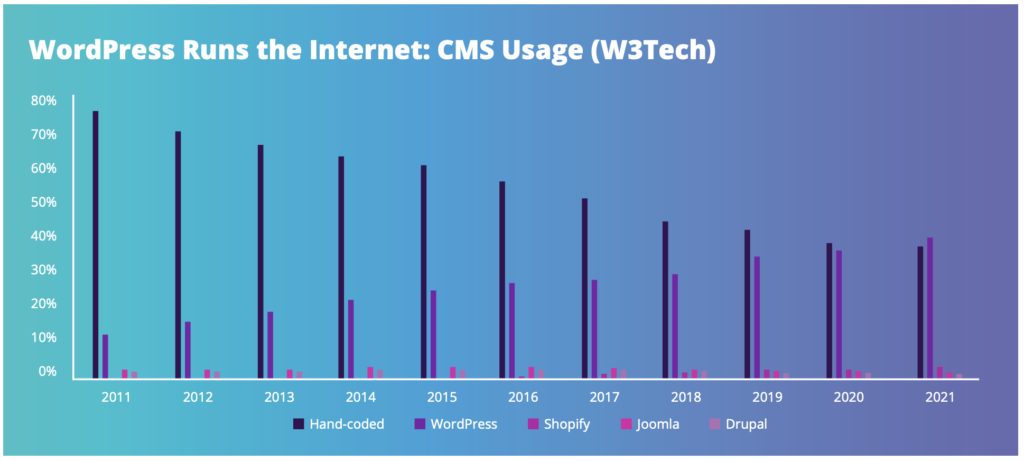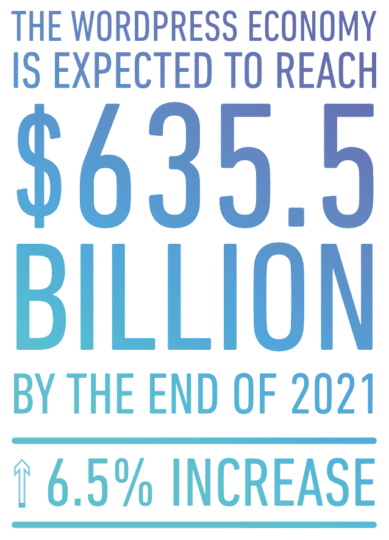The Value of WordPress: The World’s First Study of the WordPress Economy
WordPress has long played a major role as an open source content management system (CMS) that empowers digital creators with a wide array of tools and options for functionality.
Since its launch in 2003, WordPress has grown from a platform known for its popularity among bloggers to the dominant type of site on the web and the most popular way to build websites around the world.
In an effort to capture the full breadth, reach, and potential of this extensive ecosystem, WP Engine, the world’s most trusted WordPress technology company, spearheaded the first comprehensive analysis of the combined global economy for WordPress, which was estimated at $596.7 billion in 2020, and is expected to reach $635.5 billion by the end of 2021.
A Rapid Acceleration to Digital
Keeping up with evolving technology is hardly a new business challenge, but a global pandemic and the resulting changes to consumer behavior have added a new sense of urgency to the equation.
According to McKinsey, 36% of all global customer interactions in 2019 happened online. By 2020, amid the pandemic, that number had jumped to 58%. In the U.S., the average share of customer interactions rose even higher, with digital interactions jumping from 41% in 2019 to an incredible 65% in 2020.
This surge in online activity has not only accelerated existing digital trends (from mobile optimization to omnichannel marketing), it’s also made it more important—and more competitive—than ever for businesses to build an exceptional experience across all digital touchpoints.
From brick-and-mortar stores that now rely on fast, sleek eCommerce sites for sales, to larger brands reimagining the seamlessness of their online and physical experiences, today’s digital marketplace is bustling. Standing out in the crowd requires careful consideration of various technologies to bring new ideas to life.
More often than not, businesses that have emerged successfully in this online pivot are the ones that have leaned into digital solutions to enhance creativity, experiment rapidly with different business models or campaigns, and respond to changes in consumer behavior quickly.
Open source software, and WordPress specifically, has been foundational across these efforts by providing the flexibility businesses need to quickly adapt and keep up with their customers’ digital behaviors, preferences, and demands.
While some businesses have leveraged WordPress to stay ahead of the curve despite massive disruption, others have looked to it and the wider open source ecosystem as a pivotal way to press ahead in the evolving landscape that is today’s digital economy.
The Value of WordPress: The World’s First Study of the WordPress Economy
In an effort to capture the full breadth, reach, and potential of the extensive ecosystem that surrounds WordPress, WP Engine spearheaded the first comprehensive analysis of the combined global economy for WordPress, which was estimated at $596.7 billion in 2020, and is expected to reach $635.5 billion by the end of 2021.
In partnership with research firm Vanson Bourne, and the Institute of Management Studies (IMS) at Goldsmiths University of London, this research was undertaken to assess the economic value and the social impact of WordPress while providing an innovative, credible, and scientific contribution to the ongoing debates and discussions that surround it.

Commissioned by WP Engine and carried out in the U.S., UK, and Australia, research included a comprehensive review of academic and industry literature, including adjusting Organisation for Economic Co-operation and Development economic indicators for digital economies as well as complementary primary data and analysis of economic value through industry valuations and projections from surveys of WordPress Economy research group members, 400 businesses, and 400 WordPress end users.
The study also brought together an incredible, diverse group of more than 100 collaborators and co-marketers representing a cross section of the various, dynamic aspects of the WordPress ecosystem: hosts, agencies, plugin and theme providers—all businesses that derive revenue in some way from WordPress.
The main takeaway? WordPress is a driving force within the wider digital economy, fueling a massive ecosystem of makers, builders, and entrepreneurs that are leading the digital charge and meeting the inherent challenges of evolving technology head-on.
An Economy of Global Proportions
To understand the significance and scale of the WordPress Economy, it’s important to first zoom out for a full view of the larger global and digital economies.
In 2019, the most recent year for which data was available, The World Bank placed the entire global economy (based on the GDP of each individual country), at $87.7 trillion.
According to Accenture, the digital economy represents nearly a quarter of that at $19.73 trillion, making up approximately 22.5% of the entire global economy.
Spanning software, devices and infrastructure, IT and business services, emerging technologies and telecom, the digital economy is not only expansive, it’s become an indispensable part of the global economy. As the digital economy continues to grow, market data from across the U.S., UK, and Australia also indicates that a tremendous share of its economic value is generated by websites.
With a CMS market share of nearly 65%, the significance of WordPress here is hard to ignore. Today, more websites are built using WordPress than any other platform, and alongside the rapid acceleration that’s fueling the digital economy, WordPress has given rise to an open source ecosystem that represents a thriving economy in its own right.
The Most Popular Way to Build Online
As noted above, WordPress is the most dominant CMS on the market and the primary type of site on the web. WordPress is currently used by more than 40% of all websites and more than 35% of the top 10,000 most popular sites in the world by traffic. At 64.9%, its market share is far greater than all of its competitors combined.
To put that in context, the second-most widely-used CMS, Shopify, is used by 3.5% of all websites and has a CMS market share of 5.5%. Squarespace and Wix are both used by only 1.6% of all websites. Nothing else comes close to the commanding market share WordPress enjoys—and it’s continuing to rise.

WordPress also remains the fastest-growing CMS in the world. Out of the top 10 million websites by traffic, more than 500 are built each day using WordPress. That’s compared to between 60 and 80 a day built on closed, proprietary platforms such as Shopify or Squarespace.
With its market share and continued rate of adoption, the sheer number of WordPress sites has skyrocketed. Today, there are more than 82 million WordPress sites in the world, and everything from The New York Times to The White House to countless businesses of all sizes rely on WordPress to power their digital properties. In fact, there’s a good chance your own website runs on WordPress!
Flexibility, Lower TCO, and a Growing Open Source Community
So what is it that makes WordPress such a popular choice for so many different users?
One key factor is the flexibility and true site ownership WordPress provides, which is a stark contrast from closed, proprietary platforms. Because it’s built with open source code, WordPress is highly integratable, and users can freely build upon its core software.
This isn’t the case with locked-down codebases used by proprietary solutions, which also do not extend ownership over a site’s data to its users, should they wish to migrate to a new platform.
WordPress is also free from the upfront licensing fees that are often a prerequisite with vendor-specific platforms. This alone provides businesses with a unique opportunity for cost-savings to accompany the wide flexibility detailed above.
Another major differentiator for WordPress is the vibrant community that’s grown around it. Beyond the thousands of developers and engineers who have contributed to WordPress Core over the years, the larger WordPress community comprises a diverse group of web professionals, business owners, and educators (to name a few), who have fostered an incredible ecosystem that supports WordPress sites.
An Expansive WordPress Ecosystem
Each aspect of this ecosystem, as represented by distinct businesses, also contributes in some way to the overall WordPress Economy.
Hosting
This includes the more than 500 providers that offer hosting services for WordPress sites, as well as the thousands of digital and creative agencies around the world that rely on WordPress to build amazing digital experiences for their clients. More than 50,000 agencies worldwide offer some level of professional WordPress services.
Themes
The WordPress Economy also includes more than 11,000 WordPress themes (and their authors) that help sites look incredible, and in many cases, enhance site performance. This enormous collection of templates and stylesheets has grown 9X since 2010, and because themes define the appearance and display of a WordPress site, they make it easy to get started and make your WordPress site unique.
Plugins
Additionally, WordPress users can choose from more than 60,000 plugins to extend the basic functionality of WordPress and further personalize sites for their unique needs.
Because WordPress is the dominant platform on the web, nearly every major technology provider of anything from analytics to marketing technology has made a plugin that integrates their technology with WordPress sites.
Since 2010, the number of plugins for WordPress has grown 6X (from 9,600 to over 60,000), and like themes, there are many free and paid plugin options available, empowering users to build websites that fit within a specific budget.
The WordPress Economy
Based on our research, which used regression analysis to understand the correlation between revenues derived from WordPress among survey participants, including hosting providers, plugin and theme providers, agencies, infrastructure and other technology vendors, the financial value of WordPress is estimated at a staggering $596.7 billion and is forecast to reach $635.5 billion by the end of 2021.

To add further context to those numbers, the 2021 economy facilitated by WordPress is comparable to larger than the revenue generated by the Apple App Store ($634 billion), and if it were equivalent to the market cap of a company, it would rank 10th on the list of companies by market capitalization (as of May 2020)—that’s larger than the world’s most valuable automaker, Tesla, at $550.72B.
If WordPress were a country, its economy would rank 39th in the world, according to an IMF list of countries by GDP.
While the pandemic caught much of the world off guard, the incredible flexibility and agility of WordPress provided a lifeline for many businesses. Although many people and companies working with WordPress have been impacted by the global pandemic, the majority plan to invest in their business in 2021, with 42% planning to invest at an even higher rate than in 2020. As WordPress closes in on powering more than 50 percent of the web, it’s clear that investments in WordPress will pay dividends for many years to come.
WP Engine: The Leader in WordPress
WP Engine is the leader in the $597 billion WordPress Economy. The company’s platform, the fastest among all WordPress providers, powers 1.5 million digital experiences. To give you a sense of the scale this represents, WP Engine’s technology serves 3 billion page views a day, handles 5.2 billion web requests per day, and logs ~25.8 billion blocked events every year.
More of the top 10 million WordPress sites in the world put their confidence in WP Engine than any other WordPress company and more of the top 200,000 sites in the world use WP Engine to power their digital experiences than any other platform.
Fuel the Freedom to Create With WP Engine
WP Engine, the world’s most trusted WordPress technology company, powers the freedom to create on WordPress.
Contact us to see how WP Engine’s managed hosting for WordPress, eCommerce hosting solutions, and enterprise offerings, including our enterprise WordPress platform and headless WordPress solution, can power your digital front door.
Research Methodology
To conduct this research, an independent team of economists and researchers, led by Dr. Chris Brauer, Director of Innovation in the Institute of Management Studies (IMS) at Goldsmiths University of London, and Dr. Jennifer Barth, Research Director, Smoothmedia Consulting Ltd., created a conceptual framework and equation to assess both WordPress’ economic value and its social impact.
The study was conducted in 2020 during the pandemic and thus reflects the impact that Covid-19 has had on the global economy.
The research methods used were:
- A comprehensive review of academic and industry literature, including adjusting Organisation for Economic Co-operation and Development economic indicators for digital economies
- Complementary primary data and analysis of economic value through industry valuations and projections from a Vanson Bourne survey of WordPress ecosystem consortium members, 400 businesses, and 400 end-users
- 5 external SME interviews/contributions on the economic and social impact of WordPress informing our model/equation
- 4 case studies from organizations profiling the role of WordPress on economic outcomes through the pandemic crisis (drawn from US, UK, Europe, and AUS)
